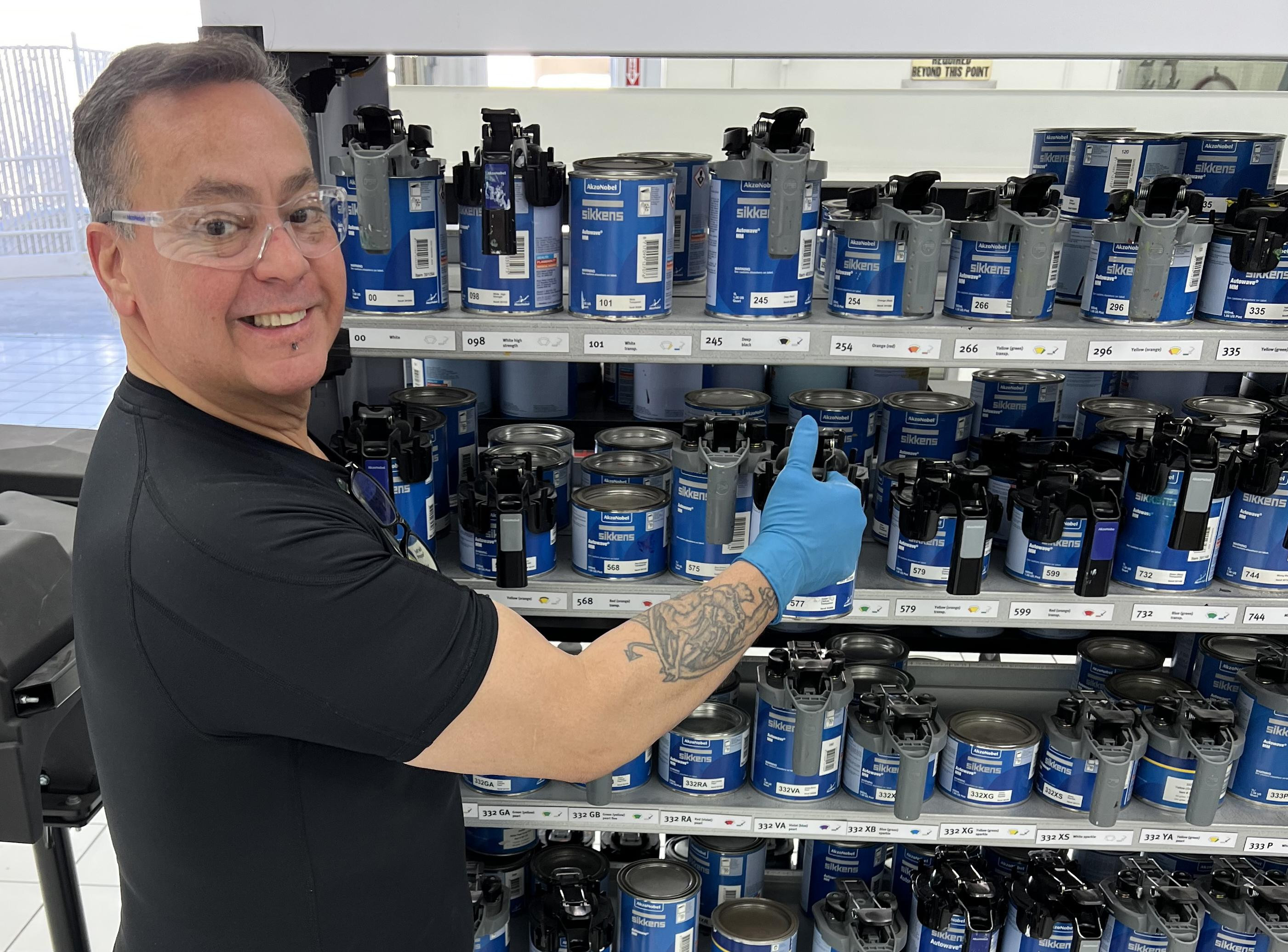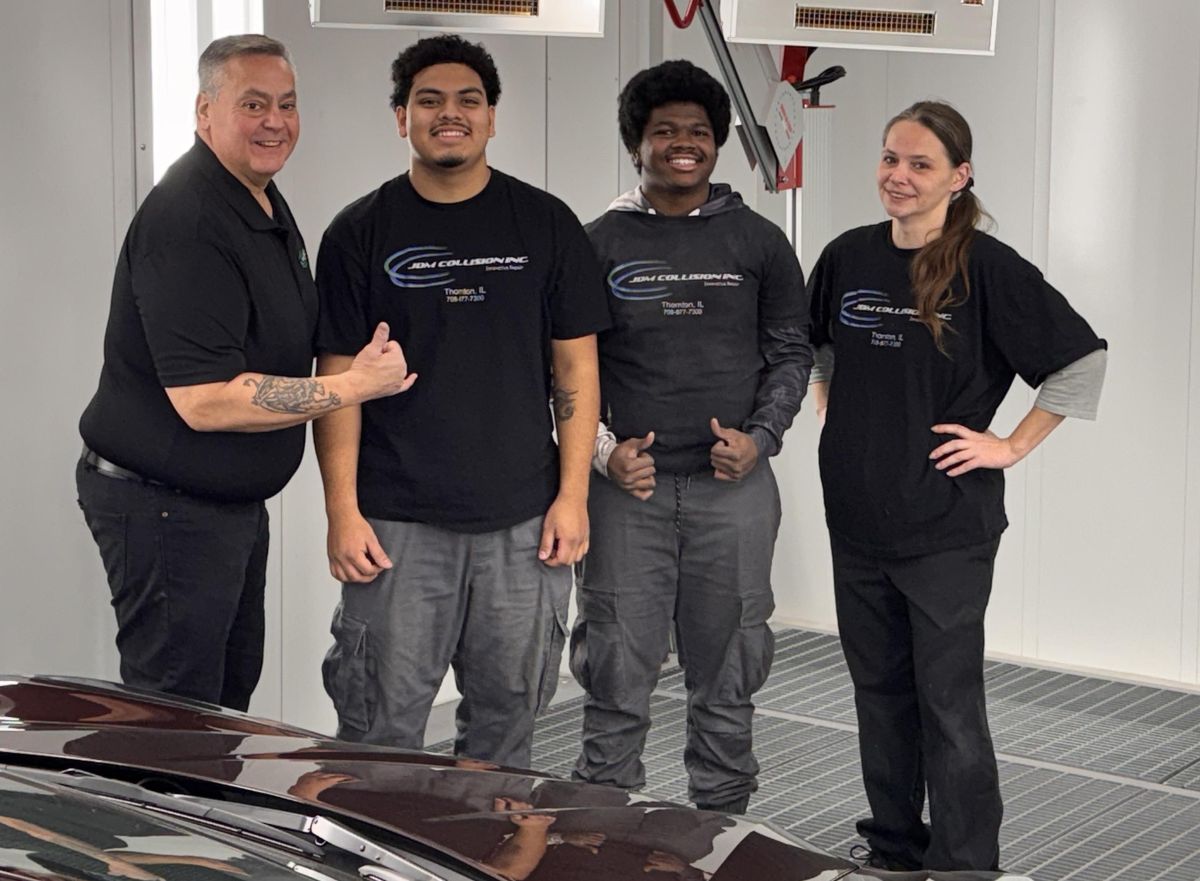JDM Collision has a dozen employees. Five are new, four of whom have less time on the planet than owner John Melendez has in shops.
“The younger generation truly has the ability to do it,” he told Autobody News.
The hires are body techs and the new paint crew at this Chicago-area facility serving five GM dealerships.
Makes sense, considering the paint center is just two months old. There’s also a new calibration set-up, at a newer site two blocks away.
All told, Melendez is north of a $1 million buy-in, with fresh blood running some of it.
Not bad for a guy who just turned 60, after 40 years in the work, and 20 owning his own shop.
Growing the Windy City’s Tech Ed Effort
The true newbies -- Diego Ramirez, Lamont Walls Jr. and Felipe Villanueva Martinez -- are still “wet paint” behind the ears. Another young tech, Omar Reyes, is also on board, and Samantha McCauley, industry vet and ex-tech instructor, is a new team lead.
 John Melendez is investing in state-of-the-art equipment to keep up with vehicle technology and attract talent.
John Melendez is investing in state-of-the-art equipment to keep up with vehicle technology and attract talent.
The three fresh faces are graduates or former students from local programs at Lincoln College of Technology and Kennedy-King College. McCauley has clocked a decade each in body shops and teaching, with her most recent latter slot at Lincoln Tech, a private program in Melrose Park, now ended.
Kennedy-King is part of the public City Colleges of Chicago, in an auto program under Kenneth McMillan. Melendez expects to start intern co-op work with McMillan next year.
“We’ll probably bring a couple more kids in on that, to show what a quality shop looks like,” Melendez said.
Melendez now also chairs education efforts for a state trade group, the Alliance of Automotive Service Professionals of Illinois (AASPI). One item on his 2025 agenda: starting a tech program at a charter school in the city.
“When we were young, there was body shop in high school,” he said.
McCauley also helps the interplay between shops and shop class. In her career, she’s sent students to former jobs -- at Lincoln Tech, she taught Walls how to weld -- and what to do first, next and always.
“One of the biggest things is to teach younger techs the right ways to do things, not take on any bad habits,” McCauley said.
Then offer them real tasks.
“I’ve heard horror stories of interns getting nothing but car washing,” she said. “They’re just a workhorse, and a low-end workhorse at that.”
Passion for the Job, Equipped to Excel
Safe to McCauley is pumped for the youth push, enjoying the new equipment, and eager to align with the vision.
“The new equipment does some really nice stuff,” she said. “It’s going to be the standard for the industry -- keeping up with car design and material.”
As some of that equipment moved in, older techs moved out, and Melendez -- already involved with I-CAR, volunteering at colleges, boothing-up at career days -- had openings for some rookies.
He meets prospects, talks briefly, hands them an application.
“I say ‘take it home, take your time,’” Melendez said.
Then he pays attention.
“It’s about seeing what their true passion is, before you bring them on.”
Then “tee them up for success” as a business coach might say, with equipment. You heard about the paint booth with robotic curing system and calibration center. Now gander at new frame racks, EV tools, chargers and “a full-blown alignment center,” which Melendez said is rare for a body shop.
“We’re trying to put us where we’re a one-stop shop” that can service other shops with some work, especially the calibration. “I see a future of independents being able to survive by being the niche business in their area,” Melendez said.
Two Kinds of Technology and a Nice Place to Work
Two-thirds of Melendez’s staff have time in the business, but the average age is dropping.
Including calibration, JDM has 12,200 square feet. The shop floor opened up after debuting the second site.
“I have space and can get more,” Melendez said. “The specialization contributes to excellence.”
Work draws on two kinds of tech: experienced staff -- the techs -- and new equipment -- the tech.
“I don’t have to worry about the consolidator,” he said.
And it’s just nice.
JDM’s hours are 8 a.m. to 5 p.m., and employees can work through their break. The shop is closed on weekends.
“The average human body hasn’t changed,” Melendez said of not unduly taxing it with a pretty chill schedule. “Honest-to-god, the best part of that is quality work.”
He might overlap a second shift after people learn the new equipment, tweaking schedules while maintaining pay. JDM does 50-60 cars a month and pre-install on the equipment was hitting $1.2 million a year in revenue.
“My ROI was good, efficiency…” he paused, considered. “With the expansion, we’re knocking on $3 million with steady pace and no compromise on quality. This is going to take off next year, and I feel very fortunate.” And -- with increased giving and scholarships and enrollment -- industry education will stay crucial.
“Shops that don’t utilize what’s available to be educated, they should not be fixing cars,” Melendez said.













Paul Hughes